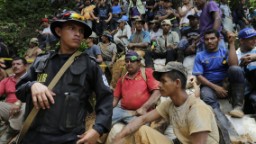NEWS (Noticias)
20 miners trapped in Nicaragua

Twenty workers were trapped and three missing Friday in Nicaragua after a collapse in a gold and silver mine, according to state media.
Rescue crews were deployed to attempt an extraction from an underground cavity, said government spokesperson Milagros Solórzano, reported El 19 Digital.
The mine is near the town of Bonanza in the country's northern mountains.
An unknown number of miners were able to escape Thursday and are recuperating in a local hospital, said Solórzano.
"We found an alternate route to retrieve the 20 miners that are confirmed alive. We are working on the rescue with the ladders to reach them and bring them out as soon as possible. We have to remember they are 2,000 feet below the ground," said Solórzano, reported El 19 Digital.
Dogs were brought in to aid emergency crews.
"They are talking and calling out for help. Some colleagues have gotten very close to them through a tunnel and have heard their screams," said Solórzano. The miners, she said, are in "optimal" condition and receiving water.
"Three other miners that were trapped are missing. We hope and trust God that they are alive," she said.
The country's civil defense, army and members of the mining company EMCO are collaborating on the rescue, according to the report.

